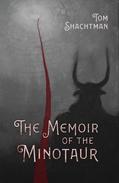
 |
Horror marries philosophical hilarity in this spin-off of the bawdy Greek myth of the minotaur. He is born of an engineered union between a white bull and Queen Pasiphaë—wife of King Minos of Crete—whose unnatural desire in this version thrusts her to a tragic end when she is slain by birthing the horned infant. As a side note, Pasiphaë is assisted in her bestial endeavor by Daedulus the architect, best known as the father of Icarus and creator of the labyrinth where Minos banishes Asterion, the minotaur. Eventually slain by Theseus, who is aided in navigating the maze by Minos' daughter and the monster's half-sister, Ariadne, Shachtman's minotaur then shares his tale with an audience of fifty centuries in Hades, waxing poetic with philosophical musings.
The author's significant experience as playwright, historian, and author of a book about serial killers serves him well in this appalling but entertaining tale. Shachtman adeptly distills the original rendering into brilliant twenty-first-century prose and characterizations, decipherable by the standards of both literary and trade fiction audiences. The contemporary slant brings these grisly aspects to life in sharp focus with minute detail, as is often customary in modern storytelling and filmmaking. Readers will also find that the illustrious but tragic minotaur engages in prodigious quantities of graphic sex and cannibalism with the sacrificial humans dispatched by Minos to the labyrinth, where both they and the monster are forever trapped. The cautionary tale explores the complexities of attachment, lust, deceit, power, violence, and the various types of suffering caused by these conditions. However, it does so in a straightforward, ribald fashion that makes the tragic subject matter more palatable and the minotaur's characterization more uniquely human.
RECOMMENDED by the US Review